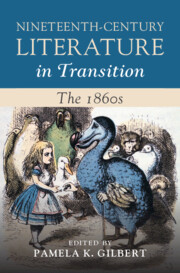Book contents
- Nineteenth-Century Literature in Transition: The 1860s
- Nineteenth-Century Literature in Transition
- Nineteenth-Century Literature in Transition: The 1860s
- Copyright page
- Contents
- Figures
- Contributors
- Introduction
- Chapter 1 Realism and Psychology
- Chapter 2 Sensational Bodies
- Chapter 3 Irish Rebellion on the Sensational Stage
- Chapter 4 Palgrave’s Golden Treasury
- Chapter 5 Impossible Monsters, Rabbit Holes, and New Worlds
- Chapter 6 Periodicals, Popular Fiction, and the Affordances of Digital Collections
- Chapter 7 Publishing in the 1860s
- Chapter 8 Italy in Transition
- Chapter 9 Silent Center, Vocal Margins
- Chapter 10 Empire and Evidence in Armadale and the Morant Bay Rebellion
- Chapter 11 Reading the Nonevental
- Chapter 12 An Age of Mythmaking
- Chapter 13 Reimagining Society
- Chapter 14 Historical Ecologies in Heterodox Economic Thought and Literary Realism of the 1860s
- Chapter 15 Extraction, Exhaustion, and the Sensation Novel of the 1860s
- Chapter 16 Evolution and the Human
- Bibliography
- Index
Chapter 9 - Silent Center, Vocal Margins
British Literary Response to the US Civil War
Published online by Cambridge University Press: 01 February 2024
- Nineteenth-Century Literature in Transition: The 1860s
- Nineteenth-Century Literature in Transition
- Nineteenth-Century Literature in Transition: The 1860s
- Copyright page
- Contents
- Figures
- Contributors
- Introduction
- Chapter 1 Realism and Psychology
- Chapter 2 Sensational Bodies
- Chapter 3 Irish Rebellion on the Sensational Stage
- Chapter 4 Palgrave’s Golden Treasury
- Chapter 5 Impossible Monsters, Rabbit Holes, and New Worlds
- Chapter 6 Periodicals, Popular Fiction, and the Affordances of Digital Collections
- Chapter 7 Publishing in the 1860s
- Chapter 8 Italy in Transition
- Chapter 9 Silent Center, Vocal Margins
- Chapter 10 Empire and Evidence in Armadale and the Morant Bay Rebellion
- Chapter 11 Reading the Nonevental
- Chapter 12 An Age of Mythmaking
- Chapter 13 Reimagining Society
- Chapter 14 Historical Ecologies in Heterodox Economic Thought and Literary Realism of the 1860s
- Chapter 15 Extraction, Exhaustion, and the Sensation Novel of the 1860s
- Chapter 16 Evolution and the Human
- Bibliography
- Index
Summary
Though London’s Evening Mail [GK9]declared that “‘The Civil War in the United States affects our people more generally even than the Indian Mutiny’” (August 22, 1862), prominent British writers avoided the topic. The sole canonical poet to represent the US Civil War in Britain was American Walt Whitman in W. M. Rossetti’s British edition (1868). Though this chapter considers working-class and feminist writers’ depiction of the war, its principal focus is the underlying causes of major writers’ persistent silence. These causes included President Lincoln’s reluctance to name slavery as the war’s fundamental issue in hopes of bringing the South back, which led many Britons to suspect economic self-interest as the North’s principal motivation; declining abolitionist sympathy based on moral complacency; Conservatives’ sympathy for the Confederacy based on shared commitment to social hierarchies; and increased racism fueled by anthropology and stereotypes of Black Americans circulated in popular minstrel shows.
- Type
- Chapter
- Information
- Nineteenth-Century Literature in Transition: The 1860s , pp. 166 - 184Publisher: Cambridge University PressPrint publication year: 2024

